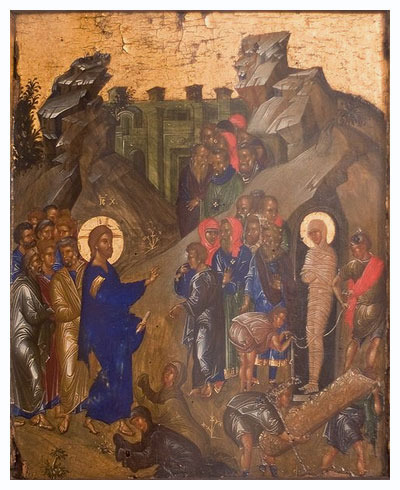"A man was raised up by Him who made man."
A Reflection on the Readings for Sunday, April 10th, the Fifth Sunday of Lent | Carl E. Olson
Readings:
• Ez. 37:12-14
• Psa. 130:1-2, 3-4, 5-6, 7-8
• Rom. 8:8-11
• Jn. 11:1-45 or 11:3-7, 17, 20-27, 33b-45
We live in a time of astounding scientific breakthroughs and unprecedented medical marvels. In my lifetime alone history has witnessed men landing and walking on the moon, significant advances in dealing with diseases and injuries, and the mapping of human DNA. Yet modern man has not yet found a way to overcome the one  thing that is inevitable for every person, regardless of their social status, income, or lifestyle: death.
thing that is inevitable for every person, regardless of their social status, income, or lifestyle: death.
The mystery of death is rooted in the reality of sin. "Therefore as sin came into the world through one man and death through sin," Saint Paul wrote about the Fall, "and so death spread to all men because all men sinned…" (Rom 5:12). Understandably, we abhor death and fight against it, however feeble and ultimately powerless are such efforts. As Pope Benedict XVI noted in his encyclical on hope, "To continue living for ever —endlessly—appears more like a curse than a gift. Death, admittedly, one would wish to postpone for as long as possible. But to live always, without end—this, all things considered, can only be monotonous and ultimately unbearable" (Spe Salvi, par. 10).
The Holy Father's remark can only make sense in the light of Christ. If this world is all that exists, it seems logical to try to find a scientific solution to the dark finality of the grave. But for the Christian, the darkness of the grave is the passageway to resurrection and everlasting life. This is made possible by the death and resurrection of Christ, as Saint Paul expounds in today's epistle. In writing of the bodily resurrection of those who are in Christ, the Apostle points out the life-giving work of the source of life, the Trinity: "If the Spirit of the one who raised Jesus from the dead dwells in you, the one who raised Christ from the dead will give life to your mortal bodies also, through his Spirit dwelling in you" (Rom 8:11).
This, if you will, is the Trinitarian "science" of salvation: the Father has raised the Son from the dead and now offers His Holy Spirit to fill us with divine life so that we might live fully in the world in come (cf., CCC 265). In the beautiful words of Saint Hilary of Poitier, "after the bath of water, the Holy Spirit swoops down upon us from high heaven and that, adopted by the Father's voice, we become sons of God" (CCC 537). This is meant to call to mind the baptism of Jesus, reminding us that just as Jesus prepared the waters of baptism for us, He also, by His death and resurrection, prepared the way to heaven.
In this light, the story of the raising of Lazarus, a friend of Jesus, is even more poignant. It displays both the full humanity of Christ—consider the simple and moving words, "And Jesus wept"—and His full divinity. As Saint Augustine put it: "A man was raised up by him who made humankind. A man was raised up by Him who made man" (Tractates on the Gospel of John, 49.1). Death can only be overcome by the one who created life, who Himself is Life itself. "I am the resurrection and the life," Jesus tells Martha, the grieving sister, "whoever believes in me, even if he dies, will live…"
After saying this, Jesus asks her if she believes His words. He does this, of course, before He raises her brother from the dead. Belief in the Christ can be aided by miracles and wonders—such signs are gifts that should lead to belief—but must finally and fully spring from encountering Him face to face and hearing His voice. "Did I not tell you," Christ tells Martha, "that if you believe you will see the glory of God?"
Science, for all of its astonishing discoveries, cannot deny death, destroy sin, or deliver heaven. Only the One who stands at the tomb and cries, "Come out!" has such power. And only by stepping into the light of His presence can we receive His freely offered, eternal life.
(This "Opening the Word" column originally appeared in the March 9, 2008, edition of Our Sunday Visitor newspaper.)
Carl E. Olson's Blog
- Carl E. Olson's profile
- 20 followers



